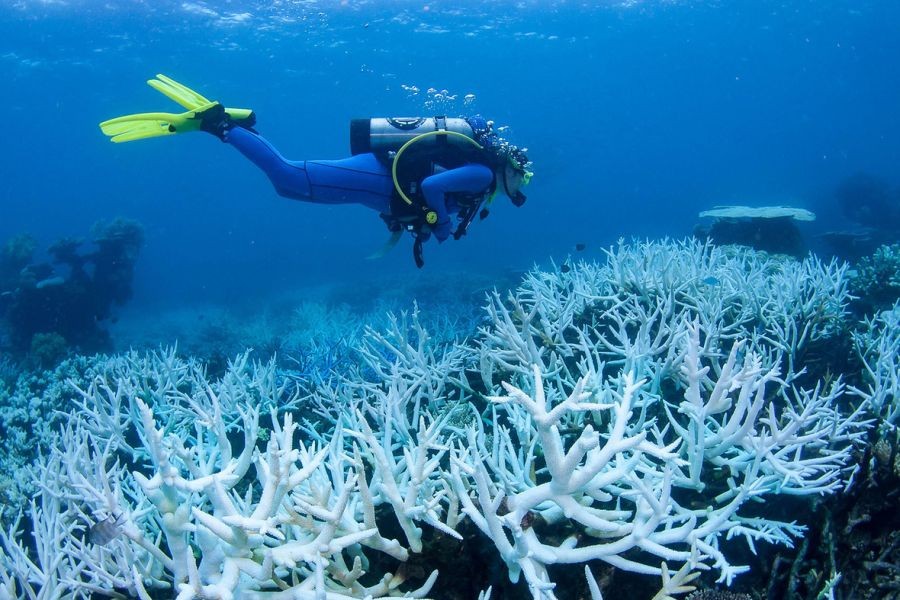Australia's Great Barrier Reef, a marvel of natural beauty and biodiversity, is under siege from widespread coral bleaching. This environmental crisis is not only a matter of ecological concern but also a significant political and economic issue, particularly in key Coalition seats that rely heavily on tourism and fishing industries linked to the Reef. As the climate changes and ocean temperatures rise, the future of this iconic marine ecosystem hangs in the balance, affecting local economies and political landscapes alike.
Understanding the Impact of Coral Bleaching
Coral bleaching occurs when corals, stressed by changes in conditions such as temperature, light, or nutrients, expel the symbiotic algae living in their tissues, causing them to turn completely white. Without these algae, corals struggle to survive. The Great Barrier Reef has experienced several mass bleaching events, with the most severe occurring in 2016 and 2017. According to the Australian Institute of Marine Science, these events have led to significant coral loss, with around 30% of the reef's corals dying in 2016 alone.
The economic ramifications of coral bleaching are profound. The Reef contributes an estimated AUD 6.4 billion annually to the Australian economy and supports over 64,000 jobs. A decline in the health of the reef could lead to a downturn in tourism, fishing, and associated industries, impacting local communities and the broader Australian economy.
Political Implications in Key Coalition Seats
In Queensland, where many seats are held by the Coalition, the health of the Great Barrier Reef is a contentious issue. The political stakes are high, as voters in these areas are directly affected by the economic outcomes linked to the Reef's condition. The Australian Bureau of Statistics (ABS) highlights tourism as a major economic driver in these regions, and any decline in reef health could influence voter sentiment, potentially swaying electoral outcomes.
The Coalition government has historically faced criticism for its environmental policies, particularly regarding climate change. With the Reef's health declining, there is increasing pressure on policymakers to take decisive action to mitigate climate impacts and protect this vital ecosystem.
Case Study: The Fight for Reef Conservation
Case Study: Australian Marine Conservation Society (AMCS) – Advocacy and Action
Problem:
The Australian Marine Conservation Society, a leading non-profit organization, has long advocated for the protection of the Great Barrier Reef. They faced significant challenges in raising public awareness and influencing policy change, particularly against a backdrop of political resistance and conflicting economic interests.
Action:
The AMCS launched a comprehensive campaign to highlight the economic and environmental importance of the Reef. They leveraged scientific research, expert testimony, and partnerships with local businesses to advocate for stronger climate policies. The organization also utilized digital media to reach a broader audience, emphasizing the Reef's role in supporting local economies.
Result:
The campaign led to increased public awareness and support, with a notable rise in grassroots advocacy. Key political figures have since acknowledged the need for action, and there has been progress in policy discussions regarding climate resilience and reef protection. The AMCS's efforts underscore the power of coordinated advocacy in driving policy change.
Takeaway:
This case study illustrates the importance of strategic advocacy and collaboration in environmental conservation. Businesses and organizations in Australia can learn from the AMCS's approach, emphasizing data-driven campaigns and stakeholder engagement to influence policy and protect natural resources.
Regulatory Insights: Navigating Environmental and Economic Policies
The Australian government has implemented various policies aimed at protecting the Great Barrier Reef. The Reef 2050 Long-Term Sustainability Plan, developed with input from the Australian Competition & Consumer Commission (ACCC) and other stakeholders, outlines strategies to manage and mitigate threats to the reef. However, critics argue that more aggressive measures are needed to address the root causes of climate change and ensure the reef's survival.
From a regulatory perspective, businesses operating in sectors linked to the Reef must navigate complex environmental laws and policies. These include compliance with the Environment Protection and Biodiversity Conservation Act 1999, which requires environmental impact assessments for activities potentially affecting the Reef.
Future Prospects: Balancing Conservation and Economic Growth
Looking ahead, the future of the Great Barrier Reef will depend on balancing conservation efforts with economic interests. According to a report by the Reserve Bank of Australia (RBA), implementing sustainable tourism practices and investing in reef restoration projects could mitigate economic losses while preserving the reef's ecological integrity.
Innovative approaches, such as coral farming and the development of heat-resistant coral species, offer hope for the reef's recovery. These efforts, coupled with robust climate policies, could secure the reef's future and sustain the economic prosperity of regions dependent on its health.
Final Takeaways
- Coral bleaching poses a significant threat to the Great Barrier Reef, with economic and political ramifications in Australia.
- Effective advocacy and policy changes are crucial for reef conservation and economic sustainability.
- Businesses must adapt to environmental regulations and explore sustainable practices to thrive in reef-dependent industries.
- Innovations in reef restoration and climate resilience are key to securing the future of the Great Barrier Reef.
Conclusion
The Great Barrier Reef's struggle with coral bleaching is a complex issue that intertwines environmental, economic, and political dimensions. As Australia grapples with these challenges, it is imperative for stakeholders to collaborate on sustainable solutions that ensure the reef's survival and the prosperity of affected communities. By fostering innovation and policy reform, Australia can lead the way in protecting one of the world's most treasured natural wonders.
Frequently Asked Questions
How does coral bleaching impact Australia’s economy?
Coral bleaching affects the tourism and fishing industries, key economic drivers in Australia. According to the Australian Institute of Marine Science, the Reef contributes AUD 6.4 billion annually to the economy, and its decline could result in significant economic losses and job impacts.
What are the biggest misconceptions about the Great Barrier Reef?
A common myth is that the Reef is resilient enough to recover without intervention. However, research shows that without significant climate action, the Reef may continue to degrade, impacting biodiversity and local economies.
What strategies are effective for reef conservation?
Successful strategies include implementing sustainable tourism practices, investing in reef restoration projects, and advocating for stronger climate policies. Collaboration between government, businesses, and conservation groups is crucial for effective reef conservation.
Related Search Queries
- Great Barrier Reef economic impact
- Coral bleaching in Australia 2023
- Reef 2050 Long-Term Sustainability Plan
- Australia climate policies 2023
- Sustainable tourism practices for reefs
- Great Barrier Reef restoration projects
- Impact of coral bleaching on tourism
- Australian Marine Conservation Society initiatives

































HortenseFr
10 months ago